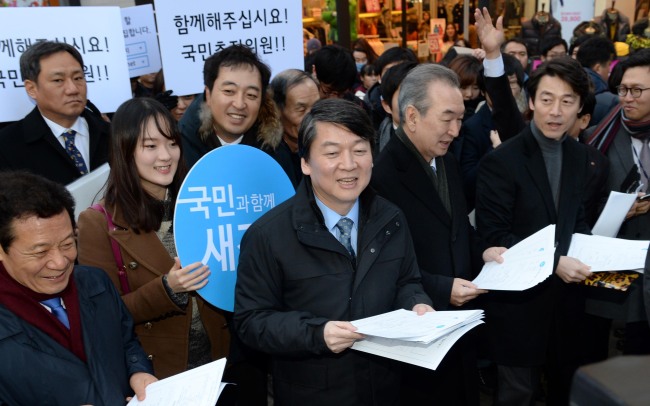
Rep. Ahn Cheol-soo (center) and figures linked to his new party including Rep. Song Ho-chang (right) engage the public in Myeong-dong, Seoul, Thursday. (Lee Gil-dong/The Korea Herald)
The upcoming local elections are gripping the political arena with six months left, while independent Rep. Ahn Cheol-soo’s potential new party is casting a deep shadow on the opposition bloc.
According to recent surveys conducted by local media outlets, the support that Ahn’s party would garner in the June 4 provincial elections would dwarf that of the main opposition Democratic Party.
One survey conducted by a broadcaster placed the DP in third place with 8.9 percent of support while the figure for Ahn’s party came in at 26.3 percent. The ruling Saenuri Party was the firm favorite with 39.8 percent.
Under the current situation, Myongji University professor Shin Yul projects that the DP could face a crisis that could split the party.
A number of DP figures including three municipal councilors of Gwangju, DP’s traditional stronghold, have already left the party to join Ahn.
As the scales tip against them, the DP lawmakers have already opened fire on Ahn and his new politics committee, on top of which the former presidential candidate hopes to build his own party.
“(Ahn’s party) can’t help but be limited by the fact that there aren’t many people who have held the public’s trust for a long time,” DP spokesman Rep. Kim Kwan-young said in a radio interview Thursday.
“As politics is something done by people, the most important factor is who takes part in the new party.”
While the DP claim to have played an essential role in ending the longest-ever railway strike, pundits say that the party siding with the union might have been a mistake.
“It might have been possible for the Saenuri Party to have been pushed into a corner, but that seems unlikely as the railway strike had gone against public opinion,” Shin said, adding that the DP would not be able to offset the disadvantage unless it took drastic measures.
During Korea Railroad Corp. union’s 22-day strike that ended on Dec. 31, union secretary-general Choi Eun-chul took refuge at the DP headquarters to avoid arrest. Choi and other union leaders continue to seek refuge at various sensitive locations such as the headquarters of the country’s largest Buddhist order and that of an umbrella union.
Aware of the odds stacked against it, the DP is also said to be fielding heavyweights such as former floor leader Rep. Park Jie-won and Chung Dong-young, who represented the party in the 2007 presidential election, in key districts in the Jeolla provinces.
Other critics, however, say that it is still too early in the game to be certain of Ahn’s victory over the DP.
“This seems to be a revival of the Ahn Cheol-soo syndrome just as it was about to disappear. The Ahn Cheol-soo syndrome is not an expression of support for a party, but the voters’ disappointment in the ruling and main opposition parties,” professor Yang Seung-ham of Yonsei University said. He added that as the Ahn Cheol-soo syndrome is represented by Ahn alone, much could change before he becomes a full-fledged political force.
“(Ahn) says that his aim is to create a new wind in politics, but what he has done so far, such as targeting Gwangju, seems to be no different from creating a power base rooted in regionalism.”
By Choi He-suk (
cheesuk@heraldcorp.com)



![[Grace Kao] Hybe vs. Ador: Inspiration, imitation and plagiarism](http://res.heraldm.com/phpwas/restmb_idxmake.php?idx=645&simg=/content/image/2024/04/28/20240428050220_0.jpg&u=)

![[Herald Interview] Mom’s Touch seeks to replicate success in Japan](http://res.heraldm.com/phpwas/restmb_idxmake.php?idx=645&simg=/content/image/2024/04/29/20240429050568_0.jpg&u=)
